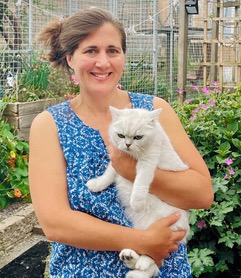Meet the woman behind world-leading breeding cattery Belle Ayr Cats, on the west coast of Scotland. Kristina Macaulay’s cats are highly sought-after pedigree pets and are also involved in genetic research.
Why did you start breeding cats?
I’d been a small-time breeder with cats, dogs, ducks, rabbits and guinea pigs. I got involved in breeding British Shorthair (BSH) cats when I saw a photo of a golden-ticked female BSH, and I was starstruck. I bought my first golden-ticked cat in 2017 and it changed my thinking about breeding. This sparked an interest in cat genetics, breed traits, breed standards and cat welfare. Things took off from there and I’ve never looked back. We did long-term boarding for cats leaving for Australia and during that time I came across Maine Coons, who were amazing. It changed my view again about cats, and how some have more toddler-like qualities.
What are your breeding ethics?
Breeding cats repeatedly year on year to a high standard requires meticulous planning and dedication. I think an ethical breeder should look at the welfare of their cats and breed to a healthy standard, and consider the whole litter as a reflection of their own quality standard, not just the best specimen.
What are you proudest of as a breeder?
That we took quality seriously and invested in the screening of our cats’ health. We set up our research clinic and created an online management system where we can set up projects and pull out our cats’ data, then submit it to faculties for research. Having set up different models for standards of reporting research and trials, we have contributed to various international research projects and subsequent veterinarian publications. Working with Professor Marie Abitbol of the Université de Lyon, we have discovered that our Golden British cats not only carry the newly discovered ‘copper gene’ but have the rarer ‘sunshine’ version, which gives such a delightful glow to their coats. We contributed 56 DNA and hair samples from our cats, which included seven litters of kittens. We have also contributed to research and set up the Feline Coronavirus Clinic.
What advice would you give new breeders?
- Speak to your local council to find out if you need a licence.
- Consider whether you will need insurance to cover employees and other people while on your premises. Risk insurance to cover cats and kittens is not a legal requirement, but is often advisable.
- Use a software management system to keep your paperwork in order.
- Don’t expect to make a profit in the first couple of years, but reinvesting in the animals’ welfare makes it a self-sustaining model.
- Every new animal placed into your breeding programme should be fully health checked by your vet.
- Build a support team around you, including other breeders and people with experience.
- Make sure your vet is willing to support you as a breeder, as not all vets can manage a breeder’s requirement schedule.
Finally, tell us something other breeders might not know about you?
I’m dual nationality, Swedish and French. I moved to Oxford and then the west coast of Scotland in the mid-1990s. I have four teenagers and I’m also a postgraduate with an MBA, and an LLM diploma in internet and policy law from the University of Strathclyde.
Give your kitten the best start in life Like Kristina does, with 4 weeks free insurance from Petplan.
